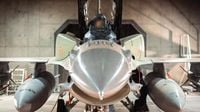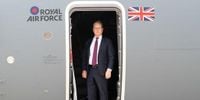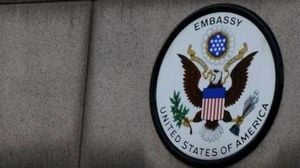The United Kingdom has significantly ramped up its military presence in the Middle East amid escalating hostilities between Israel and Iran, Prime Minister Sir Keir Starmer confirmed on June 15, 2025. As the conflict intensifies, the UK is deploying additional Royal Air Force (RAF) Typhoon FGR4 multirole fighter jets and Voyager air-to-air refuelling aircraft to RAF Akrotiri in Cyprus, a strategic base located just over 250 miles from Israel. This move underscores Britain's preparedness to protect its assets and potentially support its allies in a rapidly evolving and volatile situation.
Starmer, speaking aboard a government aircraft en route to an emergency G7 summit in Canada, described the crisis as "not only fast-moving, it’s intense," emphasizing the urgency behind the deployment. "We are moving assets to the region, including jets, and that is for contingency support. I will always make the right decisions for the UK," he stated, highlighting the government's commitment to safeguarding national interests while navigating the delicate geopolitical landscape.
The decision to reinforce RAF Akrotiri was reportedly made on the morning of June 13, 2025, as ministers closely assessed the likelihood of a broader regional conflict following deadly missile exchanges in northern Israel. Iran has fired more than 200 ballistic missiles towards Israel since the conflict erupted on June 13, many of which have penetrated Israel’s renowned Iron Dome defensive shield, resulting in at least 13 civilian deaths. In response, Israel has intensified its bombardment of Iranian territory, including targeted strikes on military facilities in Tehran and the assassination of two Iranian intelligence chiefs.
Despite the growing tension, the British government has reiterated its commitment to de-escalation and diplomacy. A senior official noted, "The Prime Minister has repeatedly emphasised the need for a diplomatic solution," underscoring the UK's preference for restraint amidst the crisis. However, the UK’s bolstered military posture signals a readiness to respond to potential threats, particularly from Iran and its proxy groups such as Hezbollah, which have threatened to escalate the conflict to include any countries supporting Israel.
Military sources reveal that the Typhoon fleet at RAF Akrotiri has been strengthened in recent days, with the jets being deployed defensively to intercept incoming enemy ordnance. The RAF Typhoons, alongside Voyager refuelling aircraft, enhance the UK's capacity to maintain a robust air defense presence in the region. The Voyagers are critical for extending the operational range of the Typhoons and also support the UK’s Carrier Strike Group (CSG), including the aircraft carrier HMS Prince of Wales, which has been conducting exercises with the Indian Navy as part of Operation Highmast.
However, any sustained RAF campaign in the Middle East could impact the CSG’s itinerary, as Voyager aircraft might be diverted to support missions protecting UK assets or allies, potentially compromising the carrier’s operational schedule. This interconnectedness of military assets highlights the complexity of the UK's strategic calculations amid the crisis.
Further compounding the UK's regional military considerations is the potential deployment of British Army troops to bolster RAF Akrotiri. Military chiefs are reportedly considering sending units from the Royal Artillery, specifically 16 Regiment (RA), which includes radar, surveillance, and guided weapons specialists. Equipped with advanced LEAPP surveillance technology and 'Giraffe' 360-degree radars, both with a 75-mile range, this regiment is capable of identifying and tracking all friendly and hostile aircraft in the vicinity.
To counter any missile or drone threats from Iran or Hezbollah, the UK could employ the Sky Sabre surface-to-air defensive weapon system. Sky Sabre can simultaneously fire up to 24 missiles and is effective against ballistic missiles and drones, with the precision to hit targets as small as a tennis ball traveling at twice the speed of sound. This layered defense system would significantly enhance the protection of RAF Akrotiri and other UK assets in the region.
Chancellor Rachel Reeves hinted at the possibility of broader military involvement, stating on June 15, 2025, "We're sending in assets to protect ourselves and also potentially support our allies." While she stopped short of confirming direct military action, Reeves acknowledged the fast-moving and volatile nature of the situation, leaving the door open for future decisions as the crisis unfolds.
The UK's relationship with Israel has been strained in recent weeks, partly due to British sanctions imposed on two Israeli ministers and London's participation in international condemnation of Israel's ongoing siege of Gaza. These tensions have led to skepticism in Jerusalem regarding London's reliability as a strategic partner. Notably, Israel did not inform the UK in advance of its recent Operation Rising Lion strikes on Iranian territory, unlike the United States and Germany, signaling a degree of diplomatic distance during this critical period.
As the UK government warns against all travel to Israel due to the escalating conflict, the military build-up reflects a broader strategic posture aimed at protecting British personnel and interests in the region. The Ministry of Defence has declined to comment on specific operational details, but the deployment of additional fighter jets and the potential arrival of army air defense units indicate a serious commitment to readiness.
With the G7 summit underway in Canada, the UK’s enhanced military presence in the Middle East sends a clear message: while it remains committed to diplomatic solutions, it is prepared to act decisively to counter threats and support its allies if necessary. The situation remains fluid, and the coming days will be critical in determining whether the conflict expands further or de-escalates through diplomatic efforts.





